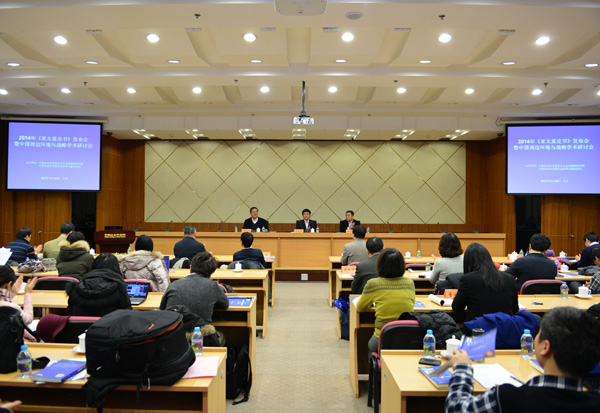Releasing Ceremony of the 2014 ‘Blue Paper Book on Asia Pacific’ and the Symposium on China’s Peripheral Environment and Strategy Conference Held in Beijing
Author: Silver Editor Source: Time :2013-12-26 10:54:00
Releasing Ceremony of the 2014 ‘Blue Paper Book on Asia Pacific’ and the Symposium on China’s Peripheral Environment and Strategy Conference Held in Beijing
The releasing ceremony of the 2014‘Blue Paper Book on Asia Pacific’ and the Symposium on China’s Peripheral Environment and Strategy Conference were sponsored by the National Institute of International Strategy of the CASS and the Social Sciences Press in Beijing on December 26th 2013. Scholars from the CASS, the Central Communist Party School, Peking University, China Institute of Contemporary International Relations, China SCO Research Center, People’s Daily participated in discussions. The releasing ceremony was chaired by Prof. Li Wen, vice director of NIIS.
Director Li Xiangyang asserts that China’s peripheral environment has entered a complex transitional era in the context of U.S.A’s rebalancing strategy and Sino-Japanese Diaoyu Island dispute. How to cope with the challenges in this kind of transitional era has become the prior task of China’s peripheral strategy. Director Li said that the coordination of peripheral strategy and global strategy is a unique task in China’s foreign relations. On regional economic cooperation, Li argues that China still needs to actively promote free trade zone with other countries, especially under the condition that various regional economic cooperation has been under way. Furthermore, director Li emphasizes that China needs to coordinate economic cooperation and security cooperation, to keep peaceful development and maintain her core interest, and to rethink her rights and responsibilities. To consolidate and promote bilateral relations, China should establish hard as well as soft cooperation relations, and manage government-oriented diplomacy and public diplomacy relations well.
In future five and ten years, the characteristics of China’s peripheral environmental stability will remain stable in general, but might be instable in some locations. For Chinese decision makings, what is more important is to understand the complex situation and to keep balance. The main tasks in China’s peripheral security environment formulation is how to turn the economic power into political power and cultural influence, and how to shift her role, from an adjuster to a formulator. In general, the opportunity and challenge always coexist.
